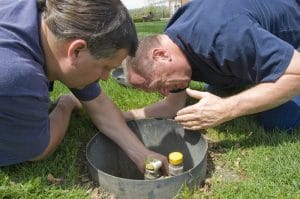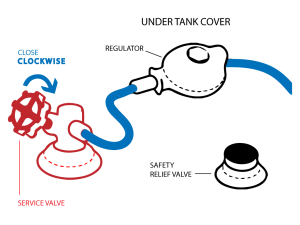As propane consumers we often wonder about the potential for a leak in our propane lines. Fortunately, propane is stored and handled with the highest safety measures. Our industry and Delta Liquid Energy adhere to strict codes lined out in NFPA 58. These codes are the benchmark for safe LP-Gas storage, handling, transportation, and use. As safe as the propane industry is, it is still in the best interests of anyone using propane to understand what to do in the event a potential leak occurs.
What is Propane?
According to the Propane Education and Research Council (PERC) propane – also known as LPG, liquified petroleum gas, or LP gas – is a liquid fuel stored under pressure. In most systems, propane is vaporized to a gas before it leaves the tank. Propane is flammable when mixed with air (oxygen) and can be ignited by many sources, including open flames, smoking materials, electrical sparks, and static electricity. Severe “freeze burn” or frostbite can result if propane liquid comes in contact with your skin.
Signs There May be a Leak in Your Propane System
Smell

The most common sign there may be an issue with your propane system is the scent of rotten eggs or a skunk’s spray. Propane, by nature, is odorless so propane industry safety standards require producers add an odorant. This is an additional layer of safety for the consumer. If this smell is in or around your house, there may be a leak.
In some cases, customers may have a difficult time smelling propane because of age, a medical condition, or the effects of medication, alcohol, tobacco, or drugs. Although it’s rare, propane can lose its odor due to the presence of water, air or rust in a propane tank or cylinder. A leak of propane through soil can also cause it to lose its distinct odor. Because there are circumstances when the odor may not be as prevalent, it is important to call Delta Liquid Energy immediately at even the faintest smell of propane so that one of our service technicians can take a look at your system.
Sight – Pilot Lights
Although propane is stored in your tank as a liquid, it releases from your tank as a colorless gas. Because propane is invisible, it’s important not to ignore the signs you can see. If you are continually having an issue with keeping your pilot light on your gas-powered appliances lit, there may be something bigger happening. Luckily, your furnace (heater) and your water heater are equipped with safety features. These features are working properly if you cannot keep your pilot light on as they are in place to alert you to a problem. An important note: When your pilot light goes out on your furnace or water heater, propane is NOT flowing and there may be no leak. The safety mechanisms in place with these appliances close the valves and flow of fuel.
Your stove is a different story. Your pilot light on your stove may go out and propane could still be flowing. However, it will not immediately permeate your home without turning the knob on your stove and engaging the electrical ignition. If you do attempt to turn on your stove and there is no flame, this could be a sign of a potential leak.
IF ANY OF YOUR PILOT LIGHTS GO OUT, it is not an issue you should attempt to fix on your own! Contact your local Delta Liquid Energy office to schedule a service call. A certified technician will come to your home and address any potential problems.
Sight – The Soapy Water Test
A second way to visually see any potential leaks is with the soapy water test. If you suspect a leak, create a soap and water solution in a spray bottle then spray a direct stream onto the hose connections to your tank. Another important note: Many soaps contain ammonia, and this is not good to use when conducting your leak test! Instead, invest in a glycerin-based soap. Fittings on propane tanks and connections are made of brass and ammonia will add stress to brass. This will then cause the fittings to erode or crack over time. Your best bet is to contact your local DLE office and have a leak test performed by a professional.
If you would like to perform the soapy water test on your own, purchasing a glycerin/water solution from our Delta RV store is a nice option. When using this solution (or a homemade glycerin/water solution), if bubbles appear there may be a leak. As a general rule, a small leak will be indicated by minimal bubbles whereas a large leak will produce large bubbles.
Sight – Insects
Finally, insects. Think flies and bees. These types of insects are attracted to the sulfur-like smell that propane emits. If you find swarms of insects hovering around your propane tank or the connection outside your home, there may be a leak present.
An Additional Layer of Precaution
Installing a propane gas detector in your home can add another layer of precaution. Under some circumstances, you may not see or smell a leak and propane gas detectors are designed to sound an alarm if they sense propane. This happens even if the added odorant can’t be detected. If one is installed in your home and you hear the alarm sounding, treat this like an emergency.
What to do if You Find Signs Indicating a Leak in Your Propane System
If any of the above sights or smells are present, there are a few precautions that should be followed.
- Extinguish any Flames – If you are using any smoking materials or open flames, they should be put out immediately. You should also discontinue using any appliances or phones (including your cell phone) and avoid turning on and off lights. Sometimes a spark can be ignited from these devices and this can trigger an explosion or fire.
- Find a Safe Space – Remove yourself and your family, or anyone else near you, from the area. If you suspect a leak indoors, everyone should immediately head outside and move a safe distance away from the building or house. If you smell a potential leak outside, make sure everyone is at least a football field-length away from where you are smelling propane.
- Shut off Your Propane Supply – If it is safe to do so, turn off your propane supply on your propane tank by turning your valve clockwise, to the right.

- Call DLE to Report the Leak – From a place away from the potential leak, call your local Delta Liquid Energy office to let us know you suspect a leak. If you cannot reach us immediately, call 9-1-1 or your local fire department.
- Stay Away – It is wise to not return to the place of the suspected leak until DLE, or emergency responders can check your system and determine it is safe to do so.
- Schedule a Check-up – Before using any of your appliances, it is a requirement that a certified DLE service technician do a thorough check of your propane system to ensure it is safe. NEVER attempt to turn your propane system back on by yourself if it has been turned off. Our service technicians will take care of that for you when evaluating your system.
None of the signs of a leak are present with my system, but I am still going through propane too quickly. There must be a leak, right?
If you can’t see or smell any indications of a leak but, feel as though your tank’s supply is still dwindling too quickly there are a few things to be mindful of:
- Time of Year & Increased Use: Often in the winter months, propane is used much more frequently than in the summer months. It is not uncommon to go through twice as much propane (or more!) in the winter than you would in the summer. Keep in mind all your appliances that may run on propane that get more use in the winter – mainly your furnace or heater. As an example, if you’ve set your thermostat to 68 degrees Fahrenheit (rather than turning it off completely) it is possible for your furnace to run in the middle of the night when temperatures dip far below that. This happens while you are sleeping and unaware, using more propane than you may anticipate.
- Sealing and Weather Striping: Using an inexpensive sealant from any hardwood store on doors and windows can help keep your home warm in the winter and cool in the summer. It will assist in reducing your energy bills because air leaks are reduced. Weather-striping will also cut down on the time it takes for your home to reach your desired temperature. If you have not yet installed weather striping in your home, it may be the cause of increased propane use.
- Comparing Dollars to Dollars & Gallons to Gallons: Sometimes we receive a propane bill and it can be higher than a previous bill. The immediate reaction should not be that there is a leak in your system but rather to take a look at previous delivery tickets. Propane prices do fluctuate throughout the year (see our blog post about how your propane price is determined) and it could be that you’ve received the same, or close to the same, quantity as previous deliveries but at a higher price. Our customer service representatives are also available to discuss your deliveries in detail, just contact your local office.
At Delta Liquid Energy we are always ready to help should you suspect a leak in your propane system. Contact us anytime for answers to your questions or to schedule a service call.
